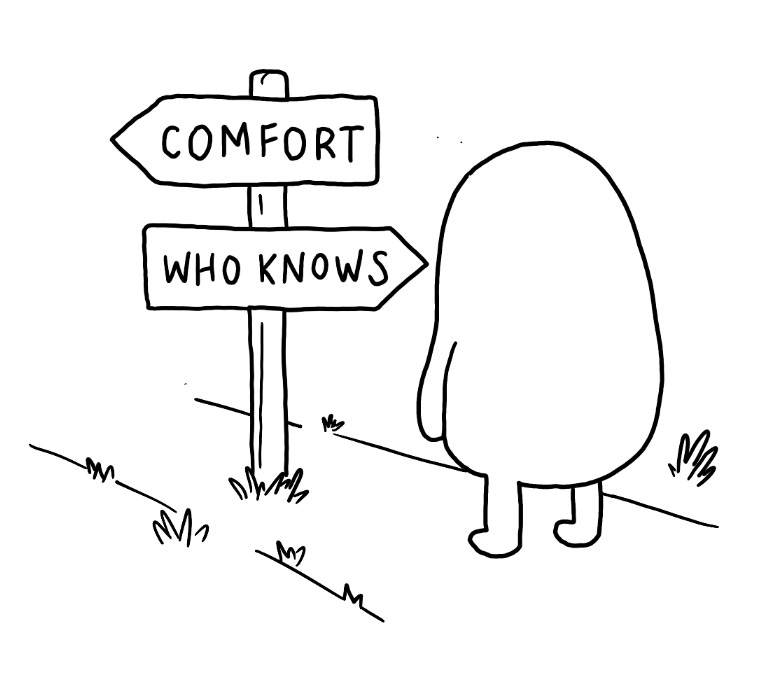Note 2: The Comfortable Trap and How ‘It’s Not Too Bad’ Is Secretly Screwing You
When your job, relationship, or existential crisis is only mildly soul-numbing—but just enough to keep you stuck
According to the Oxford Dictionary, comfort is “the state of being physically relaxed and free from pain; the state of having a pleasant life, with everything that you need.” Which sounds… suspiciously like the tagline for a mattress commercial. But the definition I find most revealing isn’t about plush couches or ergonomic chairs. It’s this one: “a feeling of not suffering or worrying so much; a feeling of being less distressed.”
In other words: It’s not too bad.
Not quite good. Not quite ease. Just… tolerable enough to stay.
There’s something about that phrase that makes me feel uneasy. It feels like an existential shrug. Like a friend who says, “Yeah, I guess we’re okay,” when you ask about their marriage, and then changes the subject to oat milk.
The infamous “It’s not too bad” a phrase I hear way too often, one I’ve used myself like emotional Febreze. That phrase should come with a warning label. May cause long-term stagnation. Prolonged exposure can lead to subtle despair, faded dreams, and mysterious Sunday night dread.
“It’s not too bad” is a seductive little lie. It sounds harmless, even humble. But it can become a state of limbo where we quietly let ourselves rot. A cheap funk that never screams loud enough to wake us up but also never lets us rest. And sure, sometimes life really is not too bad. That’s normal. That’s fine. But the trouble starts when we build a whole life inside that sentence.
We say it about our jobs: “It’s not too bad. I mean, the boss is kind of passive-aggressive and I haven’t learned anything new since 2018, but the coffee machine works most days.”
We say it about our relationships: “It’s not too bad. We mostly co-exist in silence and occasionally fight about the dishwasher, but we don’t hate each other.”
We say it about our friendships, our health, our cities, our selves.
It becomes a blanket we wrap around discomfort just enough to call it a nap. But here’s the thing: “Not too bad” isn’t neutral. It’s a trap. It numbs just enough pain to prevent action, but not enough to give joy. Sometimes we even wait for things to get worse. Like we need permission from catastrophe to finally move. Lose the job. Get dumped. Get diagnosed….Now it’s bad enough to do something.
But why do we wait for the breakdown? Maybe because comfort, even in its diluted, lukewarm version, is still comfort. And comfort, while enjoyable, often lacks meaning. Comfort doesn’t demand. Growth does.
This reminds me of a quote from Rabbi Dr. Abraham Twerski, who tells a brilliant story about lobsters (stay with me):
“The lobster’s a soft, mushy animal that lives inside a rigid shell. That shell doesn’t expand. As the lobster grows, the shell becomes too tight, and the lobster feels pressure and discomfort. So it hides under a rock, sheds the shell, and grows a new one. And it does this over and over. If lobsters had doctors, they’d never grow. They’d get a prescription, numb the discomfort, and stay in the same tiny shell. The stimulus for growth is discomfort. If we use adversity properly, we can grow through it.”
I love this quote. Not just because it makes me picture an anxious lobster trying to refill a Xanax prescription. But because it speaks directly to that cozy little phrase: “It’s not too bad.”
Sometimes what we need isn’t to escape discomfort, it’s to feel it. To stop numbing. To stop rationalizing the misalignment. To realize we’re still wearing a shell that stopped fitting years ago. The truth is, “not too bad” isn’t a place to live. It’s a rest stop. A brief moment to stretch, reflect, and pick a direction. If you hang out too long, the vending machine starts to look like a life plan.
So what now?
Ask yourself: Where in my life am I stuck in “not too bad” land?
What would it take to make it just a little worse…or a little better…so I finally move?
Because you don’t need to hit rock bottom to change. You just need to notice when the shell’s too tight. So here’s your nudge:
Don’t wait for a crisis to become the excuse. Get uncomfortable. Feel it. Shed the damn shell. Enjoy the process. Make the change!




“Maybe because comfort, even in its diluted, lukewarm version, is still comfort. And comfort, while enjoyable, often lacks meaning. Comfort doesn’t demand. Growth does.”
Well said my friend ✨
What an article loved it!!! Is a roadmap to follow to be aware of signs in our lives of confort and change to course for our benefit. Please continue writing!!